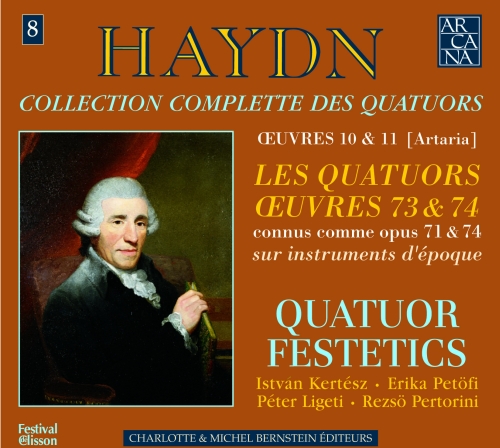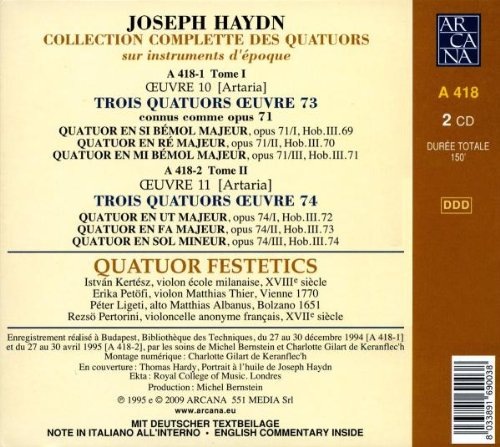
kompozytor
Haydn, Joseph
tytuł
Haydn: Les Quatuors Œuvres 73 & 74
wykonawcy
Quatuor Festetics
nr katalogowy
A 418
opis
1995 THE FESTETICS QUARTET AFTER TEN YEARS
It was back in 1985 that four musicians who held important positions in the musical life of Budapest and who had for a long time been involved in the performance of early music, decided to establish a string quartet to play the music of the Viennese classical school on period instruments. In this, they were supported by one of the most eminent Haydn scholars, László Somfai, who is at present director of the Bartók Archives.
In this way a quite new kind of collaboration was established between an eminent musicologist and a quartet in a situation to translate immediately on period instruments the effects and nuances which the researcher had shown through his study of the different manuscripts and editions which had appeared during Haydn’s lifetime. In its turn the Quartet was able to confirm or modify the work of Somfai with its own pertinent remarks and ideas.
Hungary has developed a school of string quartet playing which has left its mark on history since the nineteenth century: some of the most memorable string quartets have come from that country. And that is why we can say that while German lands have produced the composers, the bordering countries have provided the performers.
The FESTETICS QUARTET firmly belongs to this tradition: with its unity of style, the beauty of its instruments – originals and what originals! – its sense of dialogue between contrasting parts with a perfect fusion of unisons, and above all its special quality of sound which is both incisive and sweet. For the FESTETICS QUARTET making music is not a pretext for a superficial demonstration but a kind of existential respiration, with rather broad tempi, nourished by an assured cultural heritage and by the individual sensitivities of the performances. It is clear that the FESTETICS QUARTET is a real quartet.
Ideas have changed, with a desire to return to the sources, an evolution in instrumental practice and the Baroque revival which have engendered approaches that are more particular, less tied to the fancy of the performers and leaning more towards a less expressionist and more objective interpretation of the music. I myself have contributed to this evolution of ideas by favouring the interpretations that have resulted from musicological and organological research. There are however two deviations from this path which have changed the sound of the quartet and changed the message of our great elders: the development of the encounters between excellent musicians coming from different instrumental schools has produced a kind of playing that is brilliant but smooth, if lacking something in profundity and a desire to make the quartet sound like a chamber orchestra in miniature. But whereas the brilliance can bring creative benefits, the orchestral sound is a heresy which makes my hair stand on end and my teeth grind.
I said that the FESTETICS QUARTET is one of the true string quartets of our time. That is why it can arouse limitless admiration or total rejection, according to the idea of the quartet that the listener has formed. It involves not only four partners united but a single instrument of sixteen strings with total homogeneity, maintained according to each register by four musicians from the same school. Their sound implies specific unisons, dynamic gradations, very individualized timbres that result from listening to each other and, characteristic of the Hungarian school, a sound that is at the same time suave and harsh, nervous and lyrical.
The new album published by ARCANA belongs to the COMPLETE COLLECTION OFHAYDN’SQUARTETS which is presently in the course of realisation and whose publication will extend over several years. It will include the 58 authentic quartets recognized by such by their composer, following the classification of Artaria, the only catalogue established during the composer’s lifetime and with his approval.
MICHEL BERNSTEIN
nośnik
CD
x 2
gatunek
Muzyka klasyczna
producent
Arcana
data wydania
07-05-2009
EAN / kod kreskowy
8033891690038

(Produkt nie został jeszcze oceniony)
cena 79,00 zł
lubProdukt dostepny w niewielkiej ilości.
Wysyłka w ciągu 3 dni roboczych
Darmowa wysyłka dla zamówień powyżej 300 zł!
Darmowy kurier dla zamówień powyżej 500 zł!
sprawdź koszty wysyłki








































